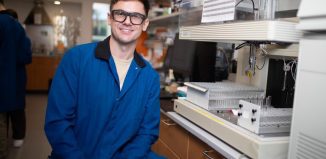SB’s Bhaduri-McIntosh studies how cancer beats tumor defenses
The human body not only defends itself against bacteria and viruses, but it also has a system to suppress or prevent tumors. Cancers, however, weaken this defense.
Sumita Bhaduri-McIntosh, an assistant professor in the Department of Pediatrics and in the Department of Molecular Genetics and Microbiology at Stony Brook University, has recently discovered a step cells take to weaken the cell’s defenses and become cancerous.
Using the Epstein-Barr virus, which causes mononucleosis and which more than 90 percent of people carry, Bhaduri-McIntosh has been able to turn healthy cells into those that divide and grow uncontrollably.
“If we take B cells (a part of the immune system) from healthy individuals and isolate those cells, we can infect them with EBV in the lab, where the virus expresses its own cancer,” she said. “This allows us to systematically examine a variety of cellular events, from minute one until we have these proliferating cells.”
Human cells have a defense called DNA damage response. This system is a set of mechanisms operating in every dividing cell that finds damage or defects in the genetic code and slows down or pauses the process of copying DNA and promotes repair of the damaged code, Bhaduri-McIntosh explained.
The virus she inserted triggered the activation and increased production of the cellular protein STAT3. Scientists knew this protein could drive gene expression and was an important ingredient in many human cancers. What they didn’t know, however, was that it also muted DNA damage response.
The results of these experiments were recently published in the journal the Proceedings of the National Academy of Sciences of the United States of America.
This finding “reveals a novel mechanism for development of cancer,” said Ayman El-Guindy, an assistant professor in the Division of Pediatric Infectious Diseases at Yale School of Medicine, where Bhaduri-McIntosh was a postdoctoral fellow and an assistant professor. Disruption of these pathways can “lead to accumulation of mutations in our genome that can ultimately cause cancer.”
El-Guindy suggested the kind of work Bhaduri-McIntosh is doing, while filled with the potential to help people, faces financial obstacles.
“While it is unfortunate that basic research is increasingly underfunded and has suffered multiple budget cuts in recent years, Dr. Bhaduri-Mcintosh’s discovery highlights the importance of basic research to develop new remedies against cancer,” El-Guindy said.
While a majority of people have the EBV, Bhaduri-McIntosh reassured people that it is extremely rare for it to become cancerous, especially in North America.
“There are EBV-related cancers that occur and are quite prevalent in other parts of the world,” including endemic Burkitt lymphoma in equatorial Africa, nasopharyngeal cell carcinoma in Southeast Asia and AIDS lymphomas.
Cancers caused by EBV can occur in as many as one in five solid-organ transplant recipients, triggered by the immunity-suppressing drugs that keep the recipient from rejecting the new organ.
A native of India, Bhaduri-McIntosh has a medical degree and a Ph.D. She sees patients as an attending physician at Stony Brook Children’s Hospital, although she spends most of her time doing research.
“When I was going through medical school in India, infectious disease is an even bigger scourge than in the western world,” she said. “You see it all around you, with tuberculosis, leprosy and parasitic diseases.” Studying infectious disease was “a very natural connection.”
Becoming an infectious disease expert “fed the detective urge,” she said, as symptoms don’t necessarily point to a specific diagnosis.
In one case when she was at Yale, she worked with a 10-year-old boy with multiorgan failure, while his bone marrow was making blood cells that were being destroyed. In an investigation of family members, she helped discover that some of them had a mutation.
The boy had a bone marrow transplant and, from the last she heard, “is doing rather well.”
Bhaduri-McIntosh credits her success to her parents in India and to her Wading River-based family. She and her husband, Michael McIntosh, the science adviser to the Foreign Animal Disease Diagnostic Laboratory on Plum Island, have a 14-year-old son, Rohin, and a 12-year-old daughter, Uma. She called the three of them “absolutely, veritable rocks.” She is also grateful for the support of the Pediatrics and Molecular Genetics departments.
When she’s not in the lab or helping patients, Bhaduri-McIntosh likes to sing. She was trained in Indian classical music. Nowadays, she sings Indian contemporary, as well as Western, music.
As for her career, working with patients and in research makes her better in both arenas, she said.






